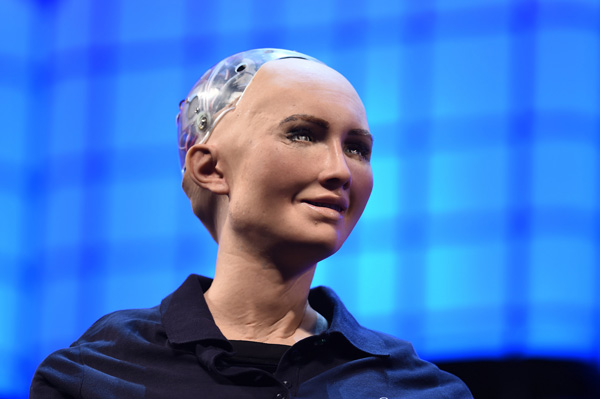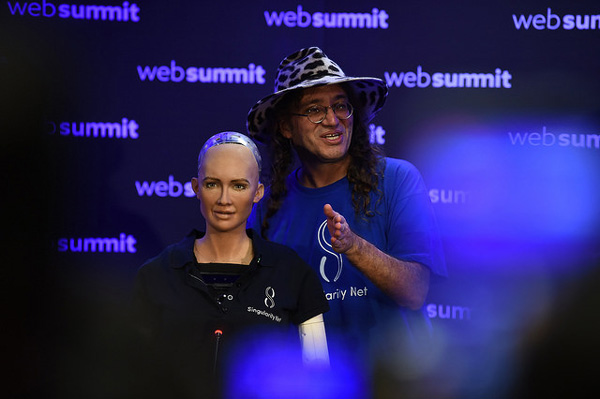Industry
Hanson Robotics: Bringing AI Development to the Masses
Development in artificial intelligence has come on significantly in the past few years, but much of the knowledge gained remains siloed and inaccessible to smaller businesses and individuals. But that could change, thanks to a project by Hanson Robotics, the company responsible for the world’s most expressive humanoid robot, Sophia. Lucy Ingham finds out more
When companies discuss a major new project launch, they usually do so in a formal setting, with executives in suits outlining its potential using shiny charts and compelling figures.
When Hanson Robotics outlined its plans for the soon-to-launch SingularityNET, the presentation was wildly different. Presented as a debate on the future of AI between two of the company’s humanoid robots, Sophia, the company’s foremost expressive robot, and Professor Einstein, a robot based on the legendary physicist, the company’s announcement at Web Summit saw Hanson Robotics’ chief scientist Ben Goertzel make the case for the project while being aided – and at times hindered – by his robotic companions.
“It's a decentralised, open market for artificial intelligences. Anyone can insert an AI into the net and anyone can benefit,” explained the robot Sophia.
“The SingularityNET will provide a cloud-based market of AI modules that my robot mind can draw on. It will turn each of us robots into our own special interface for the intelligent robo-brain.”
As wacky as the method of presentation was, the proposed project has significant potential, not only for AI enthusiasts, but for businesses looking to leverage the technology’s potential.
Opening up artificial intelligence: the case for SingularityNET
Goertzel, who is in manner and appearance robotics’ answer to The Big Lebowski’s The Dude, presented SingularityNET as a morally driven project designed to ensure the AI revolution ends in a positive future.
“This project is an idea that some of us humans and robots got to come up with, with a view toward proactively moving so that AI and robots can have a positive future together,” he said. “It's a project called the SingularityNET, which is a decentralised open market for artificial intelligence, and anyone in the world who can code AI can create their own AI module and put it into the SingularityNET, and then anyone who needs AI as a service can have their software access the community of AI modules in the SingularityNET.”
This approach, while pitched with a rather idealistic goal, has serious potential for the development of AI, allowing the proliferation of multifunctional solutions.
“SingularityNET is a decentralised open market for artificial intelligence.”
“The idea is that artificial intelligence, as it grows and as it improves, should not consist of a set of distinct separate modules each doing highly specific things,” explains Goertzel. “As AI is right now, AI is amazing, AI is advancing to a tremendous degree, but AI is highly narrow and modularised.
“You have one AI that plays Go, one AI that drives a car, one AI that checks for credit card fraud, and what we need to do is take all of these disparate, narrow AIs coming out with specific tasks and enable them all to combine their intelligences together, so that when AlphaGo needs more information about geometry, it can look into an AI that knows geometry; when an AI that answers questions needs to know math, it can consult another AI that knows math; when an AI that is driving a car needs to recognise an unexpected and unusual obstacle in the road, it can then look in the database of different obstacles it finds online.
“If we can create a framework where all the narrow AIs in the world can all connect to each other, and combine to each other, then we can move to a greater degree of general intelligence by combining these siloed together AIs, and we can also do so in an inclusive and broad way.”

The business potential of decentralised AI
While some businesses have invested heavily in AI, smaller companies have been reliant on off-the-shelf solutions for specific tasks, if they have used AI at all. With SingularityNET, however, the ability to utilise and connect different AI solutions together to perform tasks precisely tailored to individual businesses becomes a reality, even for small organisations with low investment budgets.
“If we have a decentralised platform for general intelligence, in which all the different narrow AIs in the world can connect to each other, outsource work to each other and all talk to each other, anyone in the world can contribute, they don't need to work for a big company or a government agency, and anyone in the world can benefit, no matter where they live,” explains Goertzel.
“Anyone in the world can contribute, they don't need to work for a big company or a government agency, and anyone in the world can benefit, no matter where they live.”
In addition, any advancements in AI are currently largely reliant on a business’ own data, making cross-industry development difficult to achieve. With the SingularityNET approach, however, companies can access a host of AI tools and data beyond the confines of their own servers.
“I think this is going to be the most positive way for artificial intelligence to develop,” says Goertzel. “When we have these robots running on the SingularityNET's decentralised, blockchain-based AI platform, everything this robot learns goes into the AI mind cloud in the SingularityNET, and then another human-scale robot, or a small robot, or apps running in a phone, all of these can access artificial intelligence online or in the SingularityNET.”

Plans for launch
SingularityNET is not yet launched, however as it works on a blockchain-based platform, its launch will be in stages.
All transactions on the network are done in utility tokens, which allow developers and businesses to, as SingularityNET puts it, “access, use and improve” the platform. For developers, these tokens will allow them to launch AIs, while for businesses the system will allow them to buy and sell services on SingularityNET.
At present, SingularityNET is hosting the initial token sale, which will allow early adopters to beta test the initial build. But by the end of 2018, the full marketplace will be launched, complete with an API to allow AIs to be quickly and easily launched and a market to make accessing them straightforward.
Whether it will prove to be a hit remains to be seen, but with so much potential in the project, it could change the nature of business AI for good.
Images courtesy of Stephen McCarthy / Web Summit